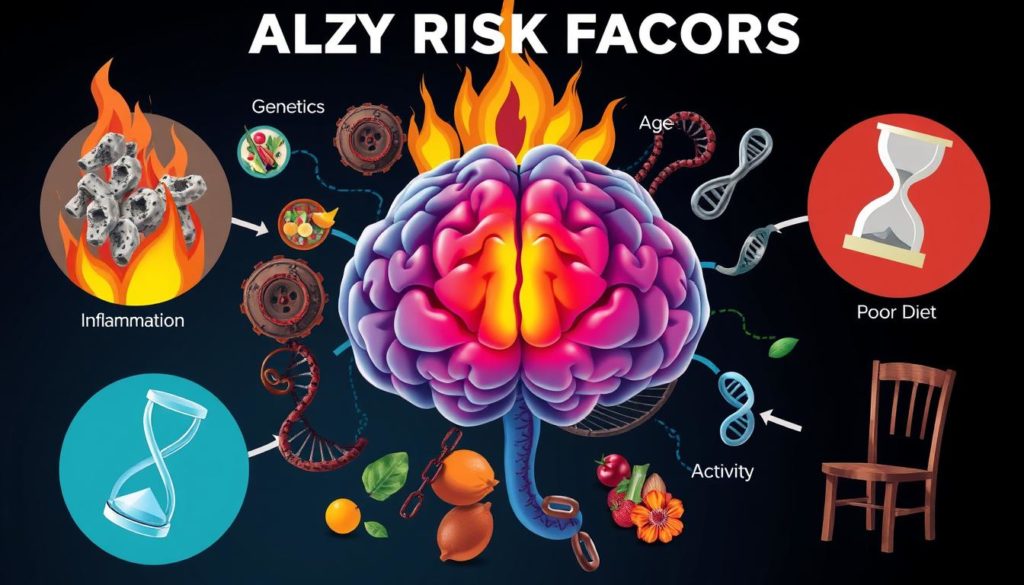Did you know over 6 million Americans live with Alzheimer’s disease? Studies show inflammation and oxidative stress might play a big role. They could be key in how this disease develops.
At its core, Alzheimer’s features beta-amyloid plaques and tau tangles in the brain. Yet, new research points to oxidative stress and inflammation’s role. Oxidative stress occurs when harmful free radicals outnumber antioxidants.
This imbalance may cause incorrect beta-amyloid formation. It gets worse with plaque buildup. Meanwhile, habits like poor diet and smoking fuel chronic inflammation. This damages brain cells, speeding up Alzheimer’s progression.
However, it’s not all bad news. Taking steps such as eating healthily, exercising regularly, and not smoking can help. These actions reduce inflammation and manage oxidative stress. They offer hope in battling Alzheimer’s.
Understanding Alzheimer’s Disease
Alzheimer’s disease affects the brain, leading to memory and thinking problems. It gets worse over time. Changes in the brain can start years before any symptoms show. These include protein build-ups that harm brain cells.

Studies are looking into how our lifestyle might affect Alzheimer’s risk. What we eat and how much we move could play a role. Along with genes, these factors might influence when and how the disease starts. Research is key to finding ways to prevent and treat Alzheimer’s.
Key Risk Factors for Alzheimer’s Disease
Alzheimer’s disease is a progressive brain disorder affected by various factors. We will explore the most important ones in detail.
Age and Genetics
The main risk factor for Alzheimer’s is age. The chance of getting it goes up as people get older. Genetics matter too. Having family members with Alzheimer’s increases your own risk.

Lifestyle and Health Conditions
Lifestyle and health play big roles. People with high blood pressure, high cholesterol, and diabetes face higher risks. Smoking and obesity also add to this risk. They cause harm to the brain by promoting oxidative stress and inflammation.
| Risk Factor | Description |
|---|---|
| Age | Older age significantly increases the likelihood of developing Alzheimer’s. |
| Genetics | A family history of the disease can heighten the risk. |
| High Blood Pressure | Elevated blood pressure can contribute to overall brain health decline. |
| High Cholesterol | High cholesterol levels are linked to increased Alzheimer’s risk. |
| Diabetes | Diabetes is a substantial risk factor connected to Alzheimer’s. |
The Role of Protein Clumps in Alzheimer’s
Scientists have found two key proteins involved in Alzheimer’s – beta-amyloid plaques and tau tangles. Studying these is vital for finding ways to prevent the disease.
Beta-Amyloid Plaques
Beta-amyloid plaques are small bits of a bigger protein. They gather, forming tough plaques between nerve cells. This blocks the cells from talking to each other. It leads to the mental decline seen in people with Alzheimer’s.
Tau Tangles
In a healthy brain, tau proteins keep neurons strong. But in Alzheimer’s, these proteins twist into tangles, killing nerve cells. Tau tangles are a major reason Alzheimer’s gets worse. They stop neurons from doing their job, harming memory and thought.
| Protein Clumps | Description | Impact |
|---|---|---|
| Beta-Amyloid Plaques | Accumulated fragments forming insoluble plaques | Hinders neural function |
| Tau Tangles | Twisted tau proteins inside neurons | Leads to neuronal death |
The Link Between Oxidative Stress and Alzheimer’s
Understanding how oxidative stress and Alzheimer’s are connected is key. Oxidative stress happens when free radicals and antioxidants are out of balance in the body. Too many free radicals can attack the body’s defenses. This can lead to diseases like Alzheimer’s.
Free Radicals and Antioxidants
Free radicals are molecules with an odd number of electrons, making them very reactive. Normally, antioxidants stop these radicals from hurting cells. But if there are too many free radicals, oxidative stress can occur. This can increase the risk of Alzheimer’s. Eating more antioxidants can help fight this imbalance and protect against oxidative stress.
Faulty Beta-Amyloid and Plaque Formation
Oxidative stress affects Alzheimer’s by causing faulty beta-amyloid production. This stress messes up normal cell functions. It makes malformed beta-amyloid proteins. These proteins stick together, creating plaques that disrupt brain cell talk.
Plaque buildup damages neural networks. It starts cycles of oxidative damage. This makes cognitive problems worse in Alzheimer’s patients.
Inflammation and Its Impact on Brain Health
Inflammation is how our bodies fight off threats. But chronic inflammation can harm us, especially our brains. It can speed up Alzheimer’s disease. Knowing how acute and chronic inflammation differ is key to understanding their effects on our minds.
Chronic Inflammation
Chronic inflammation lasts a long time and can hurt your body. It’s bad for your brain, causing protein clumps that lead to Alzheimer’s. Keeping inflammation in check is crucial for good brain health and stopping diseases from worsening.
Inflammation Triggers
Bad lifestyle choices like poor diet and smoking can trigger inflammation. So can air pollution and stress. Genes also play a role. It’s important to avoid these triggers to protect your brain health.
It’s critical to manage inflammation triggers to keep your brain healthy and lower Alzheimer’s risk.
| Inflammation Triggers | Potential Impact on Brain Health |
|---|---|
| Poor Diet | Increases risk of chronic inflammation, detrimental to brain health |
| Smoking | Elevates inflammation, contributing to cognitive decline |
| Environmental Pollutants | Prolonged exposure can trigger inflammation in the brain |
| Chronic Stress | Prolonged stress can lead to sustained inflammatory response |
Alzheimer’s, Inflammation, and Oxidative Stress
Alzheimer’s disease is linked with the harmful mix of inflammation and oxidative stress. Initially, both aim to protect the body but can become dangerous over time. When inflammation goes on for too long in the brain, it starts to damage it, which makes Alzheimer’s worse. Oxidative stress happens when there’s an imbalance between damaging free radicals and the body’s ability to fight them off with antioxidants.
Chronic inflammation is always found in Alzheimer’s, leading to more brain cell damage and speeding up symptom progression. Oxidative stress, on the other hand, leads to cell damage when unbalanced, worsening cognitive decline. This harmful loop causes a steady worsening of the condition, showing a clear need for better inflammation and antioxidant treatments.
To fight these dangers, experts are looking into various ways to treat inflammation and manage oxidative stress. These steps are key in creating better treatments for Alzheimer’s. Through such efforts, those living with Alzheimer’s can hope for a better quality of life.
Preventative Measures Against Alzheimer’s
Various strategies can help prevent Alzheimer’s and protect brain health. Living a healthy lifestyle is key to reducing Alzheimer’s risks.
Healthy Lifestyle Choices
Regular exercise and a diet full of fruits, vegetables, and omega-3s from oily fish are important. They lower inflammation and stress in the body. Keeping an optimal weight through exercise also cuts Alzheimer’s risk.
Staying mentally and socially active boosts cognitive function. This leads to better overall well-being.
Quit Smoking and Limit Alcohol Intake
Stopping smoking is critical for Alzheimer’s prevention. Cigarette toxins worsen oxidative stress, harming your brain. Making the decision to quit can improve your brain’s health.
It’s also vital to drink alcohol in moderation. Alcohol can damage brain cells and increase dementia risk. Therefore, controlling alcohol use is crucial for brain health.
Dietary Recommendations to Combat Oxidative Stress
Fighting Alzheimer’s with diet means eating foods that beat oxidative stress. Foods loaded with nutrients and antioxidants, like berries, green veggies, and nuts, help our bodies fight harmful free radicals.
Incorporating Antioxidant-Rich Foods
Adding foods high in antioxidants to your meals is key in the battle against oxidative damage. This is especially true for Alzheimer’s. Antioxidants are plentiful in berries, greens, and nuts.
Also, vitamins C and E are great for fixing cell damage. They are in many fruits and veggies. It’s best to get these vitamins from foods, not just pills.
Avoiding Processed Foods
Eating less processed foods helps fight oxidative stress. These foods can cause inflammation, making oxidative stress worse. It can also speed up Alzheimer’s. Choose whole foods over processed ones to protect your brain.
| Dietary Guidelines | Examples |
|---|---|
| Antioxidant-Rich Foods | Berries, Leafy Greens, Nuts |
| Avoid Processed Foods | Sugary Snacks, Fried Foods, Ready Meals |
Exercise and Its Benefits for Brain Health
Exercise is great for the brain, helping fight off diseases like Alzheimer’s. It helps beat the bad effects of oxidative stress and inflammation. These are linked to Alzheimer’s getting worse.
Moderate Physical Activity
Activities like walking, gardening, or swimming a few times a week are good for the brain. They increase antioxidants, which fight off harmful stress and inflammation. Doing these activities regularly helps protect your brain from Alzheimer’s.
Daily Physical Activities
Adding simple activities to your day can boost brain health. Opt for stairs over elevators or do household chores. These keep your heart healthy and your body working well. Every bit of activity helps keep your brain active and reduces Alzheimer’s risk.
FAQ
What is the link between inflammation and oxidative stress in Alzheimer’s disease?
In Alzheimer’s, inflammation and oxidative stress feed into each other. This makes a cycle that damages brain cells. It speeds up the disease’s progress.
What are the primary symptoms of Alzheimer’s disease?
Symptoms of Alzheimer’s include losing memories and having trouble thinking. These problems get worse over time.
What factors significantly increase the risk of developing Alzheimer’s disease?
Getting older and genetics can up your risk. So can high blood pressure, cholesterol, diabetes, smoking, and being overweight.
How do beta-amyloid plaques contribute to Alzheimer’s disease?
Beta-amyloid plaques are clumps that block neuron signals. This blockage is a key feature of Alzheimer’s and pushes the disease forward.
What role do tau tangles play in Alzheimer’s disease?
Tau tangles wreck neuron structure, causing them to die. They are critical in how Alzheimer’s disease gets worse.
How does oxidative stress influence Alzheimer’s disease?
Oxidative stress happens when there’s an imbalance in the body. It can make bad beta-amyloid, leading to plaques and cell death in Alzheimer’s.
What triggers chronic inflammation in the brain?
Bad diets and smoking, along with pollution, can cause long-term brain inflammation. This plays a big part in worsening Alzheimer’s.
What lifestyle choices can help prevent Alzheimer’s disease?
Eating healthy, staying active, and not smoking are key steps. They help protect against Alzheimer’s.
Limiting alcohol is important too.
Which foods are recommended to combat oxidative stress?
Foods like berries, greens, and nuts are packed with antioxidants. They help fight off harmful free radicals.
How can daily physical activities benefit brain health?
Being active helps your heart and lowers inflammation. It also boosts antioxidants. Together, these benefits can keep your brain healthy and may cut Alzheimer’s risk.


